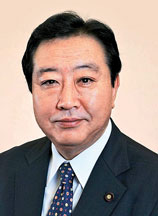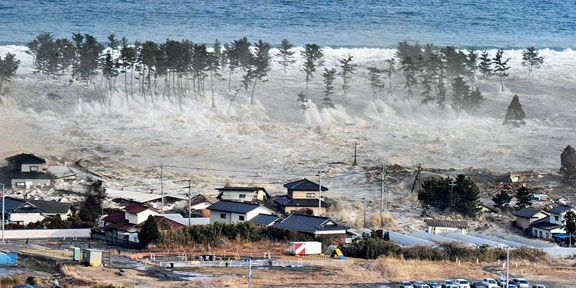A renewed determination for revitalization
Yoshihiko Noda, Prime Minister of Japan
March 11 is a date now etched in Japan’s collective consciousness. On
the first anniversary of the Great East Japan Earthquake, which
triggered the starkest crisis our country has faced in a generation, we
pause to commemorate all of those who suffered as a result of the
tragedy.
 |
|
Yoshihiko
Noda |
Our thoughts go out to all of the victims, and to people around the
world whose lives have been devastated by natural disasters.
We will not forget the loved ones, friends and colleagues who were
lost due to the disaster. Neither will we forget the outpouring of
support and expressions of solidarity that Japan received from the
international community. For this we feel deeply indebted and I take
this opportunity to reiterate Japan’s heartfelt appreciation.
Japan has made remarkable progress in responding to the disaster over
the past 12 months. We renew our commitment to learn from the great
difficulties we have faced. I firmly believe that this period of
difficulty must, and indeed will, come to mark the start of a
full-fledged revitalization of Japan.
In light of last year’s tragedy, and the mood of national solidarity
and sense of urgency that resulted, I am confident that we have the
collective will to tackle our most pressing issues: reconstruction of
areas affected by the March 11 earthquake, full decommissioning of the
Tokyo Electric Power Company’s Fukushima Dai-ichi Nuclear Power Station
and decontamination of affected areas, and revitalization of the
Japanese economy.
Residential areas
Among the many steps taken over the past 12 months in response to the
disaster has been the establishment of a budgetary and legislative
framework that laid out many of the strategic tools for reconstruction.
This included the establishment of the Reconstruction Agency, which
now acts as control tower for all reconstruction planning and serves to
significantly streamline and expedite activities, including the
establishment of reconstruction grants and special reconstruction zones.
In addition, procedures for monitoring and testing food products have
been further strengthened, while state funds in excess of one trillion
Yen have been provided for the decontamination of residential areas
close to the Fukushima Dai-ichi plant.
We recognize that the issues of greatest concern among affected
individuals, and for our nation as a whole, are the most fundamental;
job security and a sustainable livelihood for their family. Through the
creation of special reconstruction zones and other initiatives under the
concept of ‘open reconstruction,’ these regions will stimulate new
investment from Japan and overseas, creating jobs, driving the
restoration of existing industries and enhancing innovation.
The creation of a number of ‘FutureCities’ throughout Japan,
including in the disaster-hit municipalities of Ofunato, Rikuzentakata
and Higashimatsushima, is one such example. Through budgetary, tax and
regulatory measures, support will be provided to develop an industry and
social infrastructure linked with compact cities and decentralized
environmentally-friendly energy production, utilizing smart grids and
large scale solar and offshore wind farms. Japan is already a leader in
the field of energy efficiency with a wealth of innovative technologies.
Now is the time to put this expertise to use to create a new model for
growth and sustainability that we can share with the world.
Natural disasters
Another area where Japan can, and I believe must, lead the world and
share its knowledge is in disaster risk reduction and response. We have
learnt, in the harshest possible terms, that it is no longer acceptable
to claim that events had been unforeseen. In order to build resilient
communities and a country that is able to withstand natural disasters
and is sustainable, disaster management measures are undergoing a
comprehensive review and will be dramatically strengthened.
 |
|
March 11,
2011 tsunami in Japan. File photo |
Of course, Japan also faces challenges that were apparent before last
year’s earthquake, tsunami and nuclear disaster. Some, such as securing
robust economic growth and rebuilding government finances, we have been
tackling for a number of years. The longer these issues are left
unresolved, the more serious they become.
Above all else, the promise that I have made to the Japanese people
since becoming Prime Minister in September last year is that I will no
longer tolerate the politics of indecision.
A propensity to delay difficult and weighty decisions has been
hurting our country, is detrimental to our economy, society and our
future and cannot be allowed to continue.
The many projects now underway for the reconstruction and
revitalization of Japan constitute the first step toward the country’s
economic revival. With global economic uncertainty, historic
appreciation of the Yen and long-standing deflation, securing robust
economic growth is a momentous challenge, but it is not insurmountable.
Rapid economic expansion
We must draw upon the unique strengths of the Japanese economy, seek
an open and cooperative approach with our international partners, and
intelligently exploit the promise of new growth areas. Sectors such as
energy, the environment, health and nursing care hold significant
potential as leading growth industries, where Japan can tap innovative
ideas and investment from the private sector, including foreign direct
investment, and play a leading role globally.
We aim to create the conditions to support increased international
interest and investment in Japan, not only from a business perspective,
but also in the growth of tourism. As a prerequisite, we commit to
providing timely and accurate information to the international
community.
In recent history, Japan seized rapid economic expansion from the
ashes and desolation of World War II, and built the most
energy-efficient economy in the world in the aftermath of the oil shock.
On the anniversary of the Great East Japan Earthquake we are reminded
that we are now faced with a challenge of similar proportions. Our goal
is not simply to reconstruct the Japan that existed before March 11,
2011, but to build a new Japan. This is an historic challenge and one
that we are determined to overcome.
|



